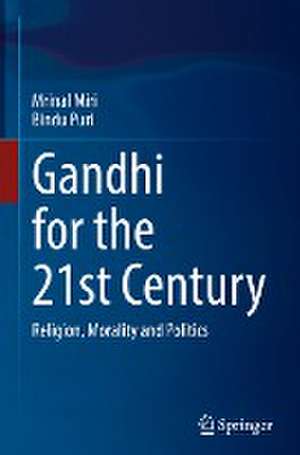Gandhi for the 21st Century: Religion, Morality and Politics
Autor Mrinal Miri, Bindu Purien Limba Engleză Hardback – 20 iul 2023
Preț: 635.15 lei
Preț vechi: 747.23 lei
-15% Nou
Puncte Express: 953
Preț estimativ în valută:
121.57€ • 132.10$ • 102.19£
121.57€ • 132.10$ • 102.19£
Carte disponibilă
Livrare economică 31 martie-14 aprilie
Preluare comenzi: 021 569.72.76
Specificații
ISBN-13: 9789819937912
ISBN-10: 9819937914
Pagini: 198
Ilustrații: IX, 198 p. 1 illus.
Dimensiuni: 155 x 235 mm
Greutate: 0.27 kg
Ediția:1st ed. 2023
Editura: Springer Nature Singapore
Colecția Springer
Locul publicării:Singapore, Singapore
ISBN-10: 9819937914
Pagini: 198
Ilustrații: IX, 198 p. 1 illus.
Dimensiuni: 155 x 235 mm
Greutate: 0.27 kg
Ediția:1st ed. 2023
Editura: Springer Nature Singapore
Colecția Springer
Locul publicării:Singapore, Singapore
Cuprins
Introduction.- Satya and Ahimsa: Learning Non-violence from the Gita.- Ethics: Western and Indian.- For Love of Country: Gandhi and Tagore.- Body, Action, Authority, Ethics and Politics.- Gandhi’s ‘true’ politics and the integrity of the good life: Satya, swaraj, tapasya and satyagraha.- Gandhi’s Religion.
Notă biografică
Mrinal Miri is a well-known philosopher. Born in 1940, he took his Ph.D. from Cambridge University. He is the author of several books and has published numerous articles in professional journals including Mind, Philosophical Studies, Philosophy and Phenomenological Research, etc. His recent paper, entitled “Indigenous Knowledge and its Transformation,” published by NUEPA, has drawn much critical attention. He served as Director of the Indian Institute of Advanced Study, Shimla, and as Vice Chancellor of North-Eastern Hill University. He was also nominated as Member of the Upper House (Rajya Sabha) of the Indian Parliament.
Bindu Puri is a professor of modern and contemporary Indian philosophy at the centre for philosophy, school of social sciences, Jawaharlal Nehru university. Her main interests are in the areas of modern Indian philosophy and political philosophy. Puri has over 58 papers in edited anthologies and philosophical and interdisciplinary journals. She has authored three monographs; Gandhi and the Moral Life (2004) The Tagore-Gandhi Debate: On Matters of Truth and Untruth (Springer Nature Publications: 2015); and The Ambedkar-Gandhi Debate: On Identity, Community and Justice (Springer Nature Publications: 2022). She has eight edited volumes, the most recent being Reading Sri Aurobindo - Metaphysics Ethics and Spirituality (Springer Nature Publications: 2022). She has presented over 180 papers and lectures at national and international forums. Professor Puri is a fellow of the Australia India Institute, university of Melbourne and was the Sugden fellow at Queen’s College, university of Melbourne for 2023. Puri delivered the prestigious annual ‘M K Gandhi lecture on Peace and the Humanities’ 2017 for the Mahatma Gandhi Peace Council of Ottawa in Canada as well as the Johnson and Hastings lectures at the university of Mount Allison, in Canada for the same year. Puri also delivered the prestious annualSugden Oration 2023 at Queen’s college, university of Melbourne in Australia and delivered lectures at the Australia India Institute and the Melbourne Law school at the university of Melbourne in the same year.
Bindu Puri is a professor of modern and contemporary Indian philosophy at the centre for philosophy, school of social sciences, Jawaharlal Nehru university. Her main interests are in the areas of modern Indian philosophy and political philosophy. Puri has over 58 papers in edited anthologies and philosophical and interdisciplinary journals. She has authored three monographs; Gandhi and the Moral Life (2004) The Tagore-Gandhi Debate: On Matters of Truth and Untruth (Springer Nature Publications: 2015); and The Ambedkar-Gandhi Debate: On Identity, Community and Justice (Springer Nature Publications: 2022). She has eight edited volumes, the most recent being Reading Sri Aurobindo - Metaphysics Ethics and Spirituality (Springer Nature Publications: 2022). She has presented over 180 papers and lectures at national and international forums. Professor Puri is a fellow of the Australia India Institute, university of Melbourne and was the Sugden fellow at Queen’s College, university of Melbourne for 2023. Puri delivered the prestigious annual ‘M K Gandhi lecture on Peace and the Humanities’ 2017 for the Mahatma Gandhi Peace Council of Ottawa in Canada as well as the Johnson and Hastings lectures at the university of Mount Allison, in Canada for the same year. Puri also delivered the prestious annualSugden Oration 2023 at Queen’s college, university of Melbourne in Australia and delivered lectures at the Australia India Institute and the Melbourne Law school at the university of Melbourne in the same year.
Textul de pe ultima copertă
This book examines the centrality of ideas such as satya (truth), ahimsa (non-violence), humility, and respect for understanding moral life in the complex milieu of human existence. It provides a comprehensive view of how Gandhian ideas have both a temporal and spatial universality significantly different from Western modern philosophy's universality claims. The chapters represent different styles of philosophy but with a common purpose, offering insights into how the global debates on religion, morality, and politics are assessed from Gandhi's point of view. Written in language accessible to general readers with an interest in Gandhian thinking, the book will appeal to academics and philosophers.
Caracteristici
Offers contemporary insights to help readers understand Gandhi’s philosophy Explores comprehensively the study and evaluation of Gandhi Presents work written by experts in the field of philosophy
